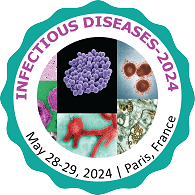Sessions & Tracks
Infectious Diseases
Infectious diseases are caused by pathogenic microorganisms like bacteria, viruses, parasites, or fungi. They spread through direct or indirect contact, causing illness in humans, animals, and plants. Common examples include influenza, HIV/AIDS, tuberculosis, malaria, and COVID-19. Prevention involves vaccination, good hygiene practices, and public health measures.
Research on Medicine and Vaccine for Covid-19
Research on COVID-19 vaccines and treatments has been a global priority since the outbreak began. Scientists have developed several vaccines using various technologies like mRNA and viral vector platforms. These vaccines have undergone rigorous testing for safety and efficacy. Additionally, ongoing research focuses on antiviral drugs and monoclonal antibodies for treatment.
Parasitology & Infectious Diseases
Parasitology studies parasites that cause infectious diseases in humans, animals, and plants. These parasites, like Plasmodium causing malaria or helminthes causing intestinal infections, often have complex life cycles. Understanding their biology and interactions with hosts is crucial for developing effective treatments and preventive measures, impacting global health significantly.
Vaccines and Vaccination
Vaccines are biological preparations that stimulate the immune system to recognize and fight specific pathogens, preventing disease. They contain weakened or killed forms of the pathogen or its proteins, allowing the body to develop immunity without causing illness. Vaccination, the process of administering vaccines, is a critical public health intervention, preventing millions of deaths worldwide from infectious diseases each year.
Infectious Diseases Epidemiology
Infectious diseases epidemiology studies the distribution, determinants, and dynamics of infectious diseases within populations. It examines factors such as transmission routes, risk factors, and patterns of disease spread to inform prevention and control measures. Epidemiological studies utilize data analysis, surveillance systems, and mathematical modeling to understand disease trends, identify outbreaks, and assess the impact of interventions. This field plays a critical role in shaping public health policies, strategies, and interventions to mitigate the burden of infectious diseases.
Nosocomial Infections & Control
Nosocomial infections, also known as healthcare-associated infections (HAIs), are acquired during hospitalization or healthcare delivery. They're caused by bacteria, viruses, fungi, or other pathogens and can lead to complications and increased healthcare costs. Infection control measures like hand hygiene, sterilization, and isolation protocols are crucial for preventing and managing nosocomial infections, safeguarding patients and healthcare workers.
Veterinary Diseases
Veterinary diseases affect animals, impacting their health, welfare, and sometimes posing risks to humans through zoonotic transmission. They can be caused by bacteria, viruses, parasites, or fungi and affect various species, including livestock, pets, and wildlife. Veterinary professionals play a crucial role in preventing, diagnosing, and treating these diseases to ensure animal and public health.
Tropical Infectious Diseases
Tropical infectious diseases are prevalent in tropical and subtropical regions due to favorable environmental conditions for disease vectors and pathogens. Examples include malaria, dengue fever, Zika virus, Chagas disease, and schistosomiasis. These diseases pose significant health burdens and require comprehensive strategies for prevention, control, and treatment in affected regions.
Infection, Immunity and Inflammation
Infection triggers the immune system's response, leading to inflammation. Immunity is the body's ability to resist infection and its harmful effects. Inflammation is a protective response involving immune cells and chemicals to eliminate pathogens and repair tissue damage. Deregulation of these processes can lead to chronic diseases like autoimmune disorders or allergic reactions.
Internal Medicine for Infectious Diseases
Internal medicine focuses on the prevention, diagnosis, and treatment of various infectious diseases affecting internal organs and systems. Physicians specializing in infectious diseases evaluate patients with conditions such as bacterial, viral, fungal, or parasitic infections. They employ diagnostic techniques, prescribe antimicrobial therapies, and develop management plans tailored to individual patients, often in collaboration with other medical specialists.
Bacterial Infectious Diseases
Bacterial infectious diseases are caused by pathogenic bacteria and can affect various parts of the body, leading to a wide range of symptoms and complications. Common bacterial infections include strep throat, urinary tract infections, pneumonia, tuberculosis, and foodborne illnesses like salmonella and E. coli. Treatment often involves antibiotics specific to the type of bacteria causing the infection, along with supportive care to manage symptoms and promote recovery.
Causes and Symptoms of Infectious Diseases
Infectious diseases are caused by pathogens such as bacteria, viruses, parasites, or fungi. These microorganisms can enter the body through various routes, including direct contact, airborne transmission, or ingestion of contaminated food or water. Symptoms vary depending on the type of infection but may include fever, cough, fatigue, diarrhea, rash, and more severe manifestations in some cases. Prompt diagnosis and treatment are crucial for managing infectious diseases and preventing their spread.
Pediatric Infectious Diseases
Pediatric infectious diseases affect infants, children, and adolescents, caused by bacteria, viruses, parasites, or fungi. Common examples include respiratory infections like influenza, gastrointestinal illnesses such as rotavirus, and childhood infections like chickenpox and measles. Diagnosis often involves clinical evaluation, laboratory tests, and imaging studies. Treatment may include antibiotics, antiviral medications, supportive care, and vaccination to prevent future infections and protect public health.
Viral Infectious Diseases
Viral infectious diseases are caused by viruses and can affect various organs and systems in the body. Common examples include influenza, common cold, measles, HIV/AIDS, and COVID-19. These viruses spread through respiratory droplets, bodily fluids, or contaminated surfaces. Symptoms vary widely but may include fever, cough, sore throat, fatigue, and rash. Prevention strategies include vaccination, good hygiene practices, and antiviral medications for treatment in some cases.
Fungal Infectious Diseases
Fungal infectious diseases, caused by fungi, can affect different parts of the body and range from mild skin infections to severe systemic diseases. Common examples include athlete's foot, yeast infections, and invasive fungal infections like candidiasis and aspergillosis. Risk factors include weakened immune systems, prolonged antibiotic use, and environmental exposure. Treatment typically involves antifungal medications, but severe cases may require hospitalization and intensive care. Early diagnosis and prompt treatment are essential for successful management.
STD and HIV Infection
Sexually transmitted diseases (STDs) are infections transmitted through sexual contact. Common STDs include chlamydia, gonorrhea, syphilis, and genital herpes. Human immunodeficiency virus (HIV) is a virus that attacks the immune system, leading to acquired immunodeficiency syndrome (AIDS). HIV is primarily transmitted through sexual contact, sharing needles, or from mother to child during childbirth or breastfeeding. Prevention strategies include practicing safe sex, using condoms, and regular testing for early detection and treatment.
Neuro Infectious Diseases
Neuro infectious diseases affect the nervous system and are caused by infectious agents like bacteria, viruses, parasites, or fungi. These diseases can lead to various neurological symptoms, including headache, fever, altered mental status, seizures, and paralysis. Examples include meningitis, encephalitis, and neurocysticercosis. Diagnosis often involves imaging studies, cerebrospinal fluid analysis, and laboratory tests. Treatment may include antimicrobial medications, antiviral drugs, and supportive care to manage neurological complications. Early diagnosis and treatment are crucial for preventing long-term neurological damage.
Pharmacology of Infectious Diseases
The pharmacology of infectious diseases focuses on the study of medications used to prevent, treat, and manage infections caused by bacteria, viruses, fungi, and parasites. This field encompasses various drug classes, including antibiotics, antivirals, antifungals, and antiparasitic drugs. Pharmacological interventions aim to target specific pathogens, disrupt their growth or replication, and enhance the body's immune response to combat infections effectively. Understanding drug mechanisms, dosing, interactions, and resistance patterns is essential for optimizing treatment outcomes in infectious diseases.
Clinical and Case Reports
Clinical and case reports are detailed accounts of patient diagnoses, treatments, and outcomes, serving as valuable sources of medical knowledge and evidence. These reports document rare or unusual medical cases, novel treatment approaches, adverse reactions to medications, and diagnostic challenges encountered in clinical practice. They provide insights into disease mechanisms, treatment efficacy, and patient management strategies, contributing to medical education, research, and improving healthcare practices globally.











